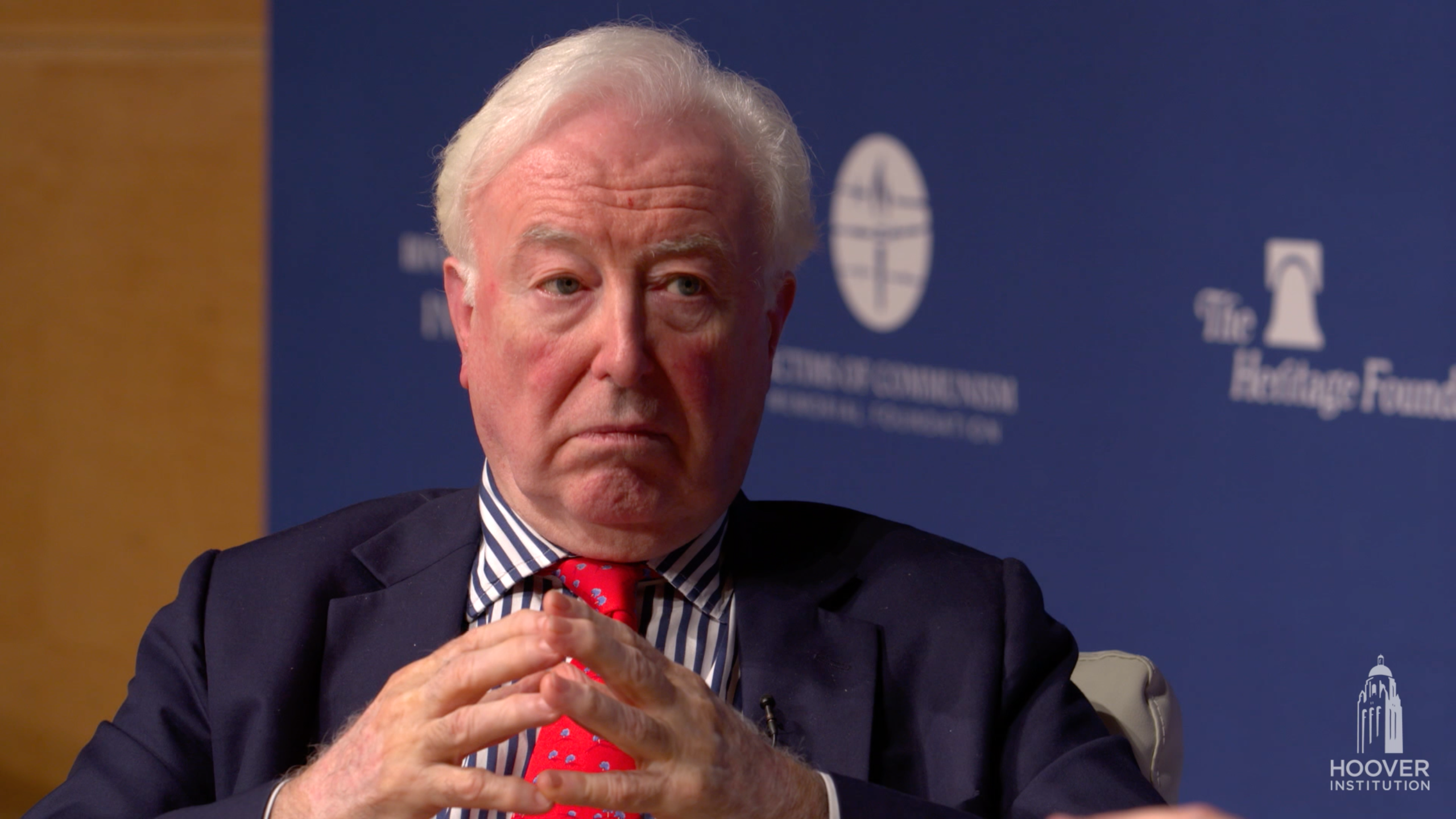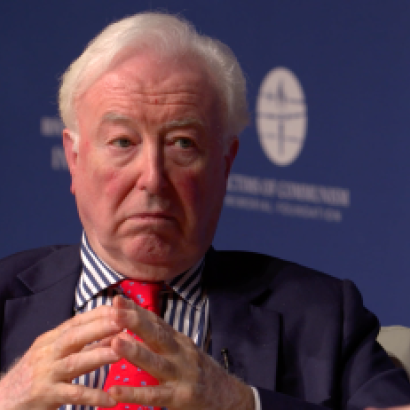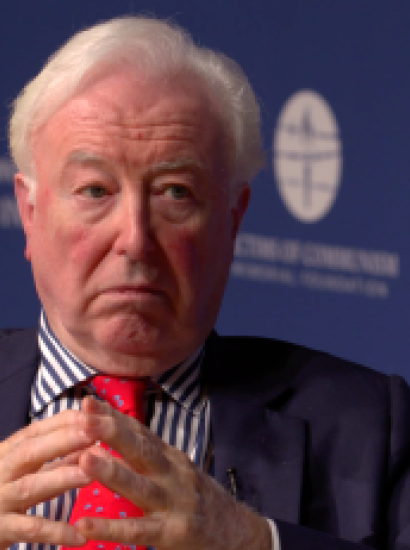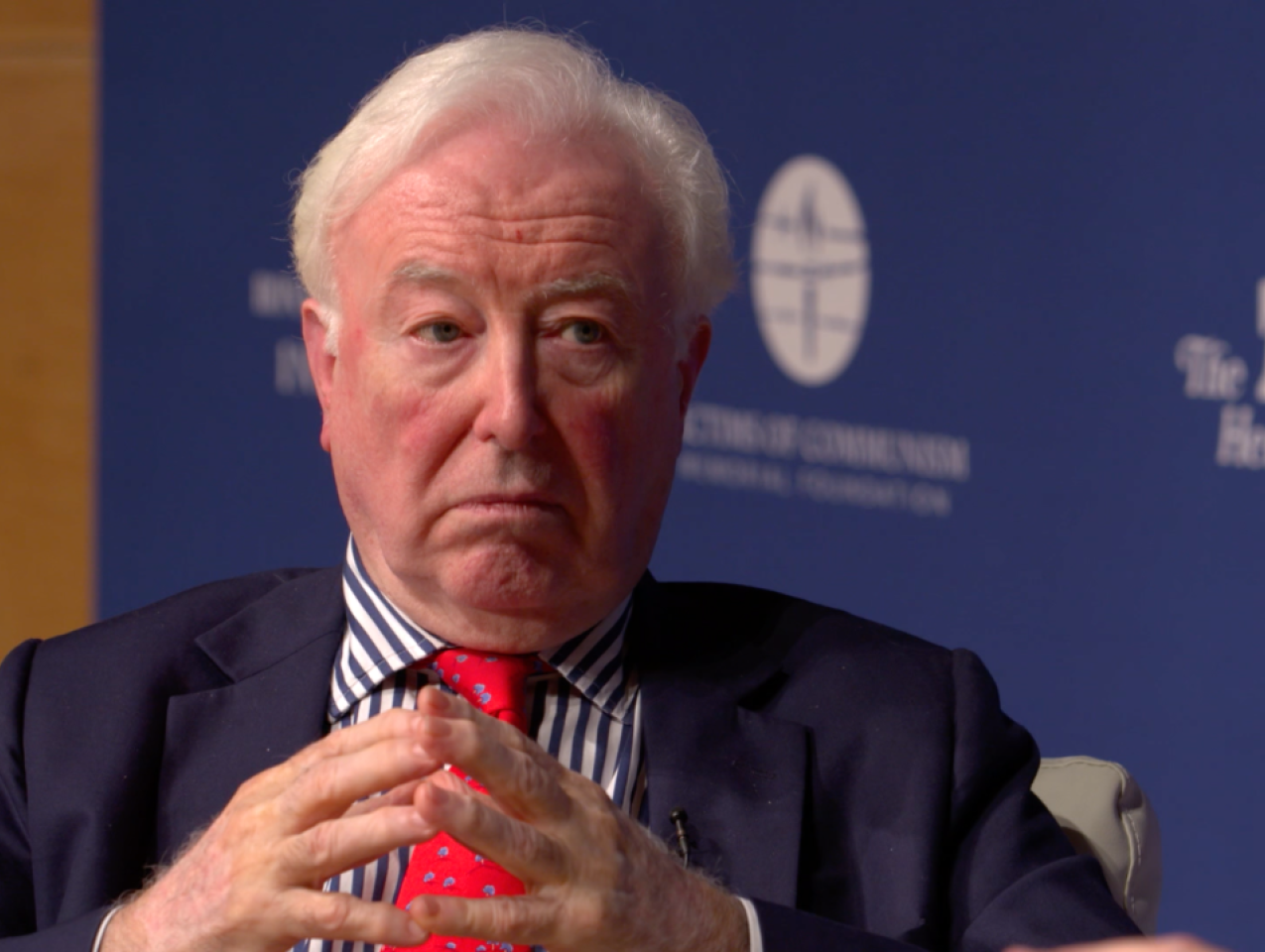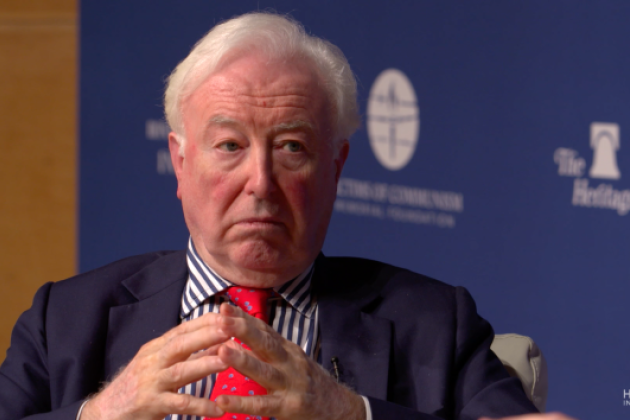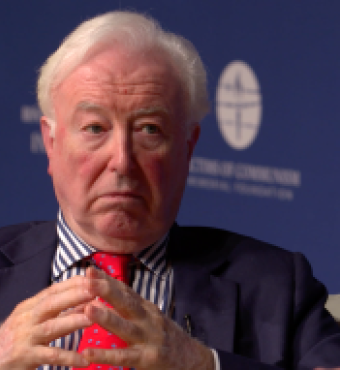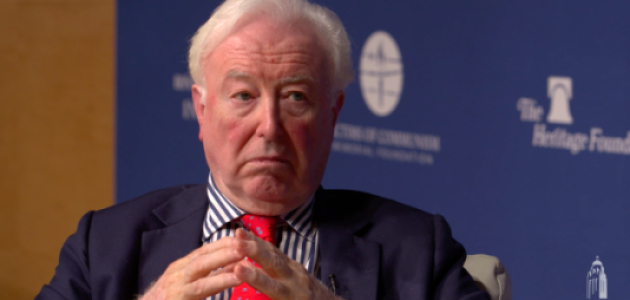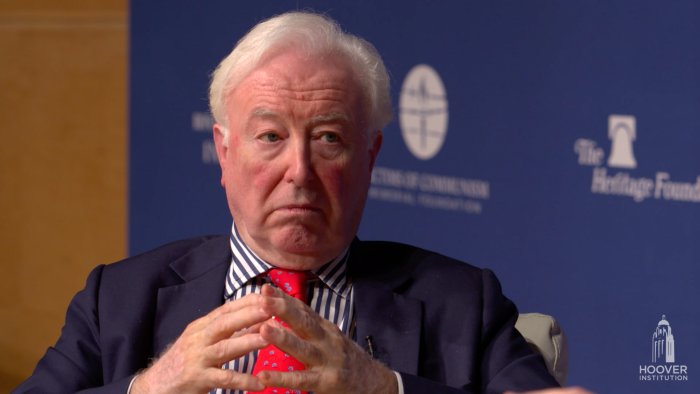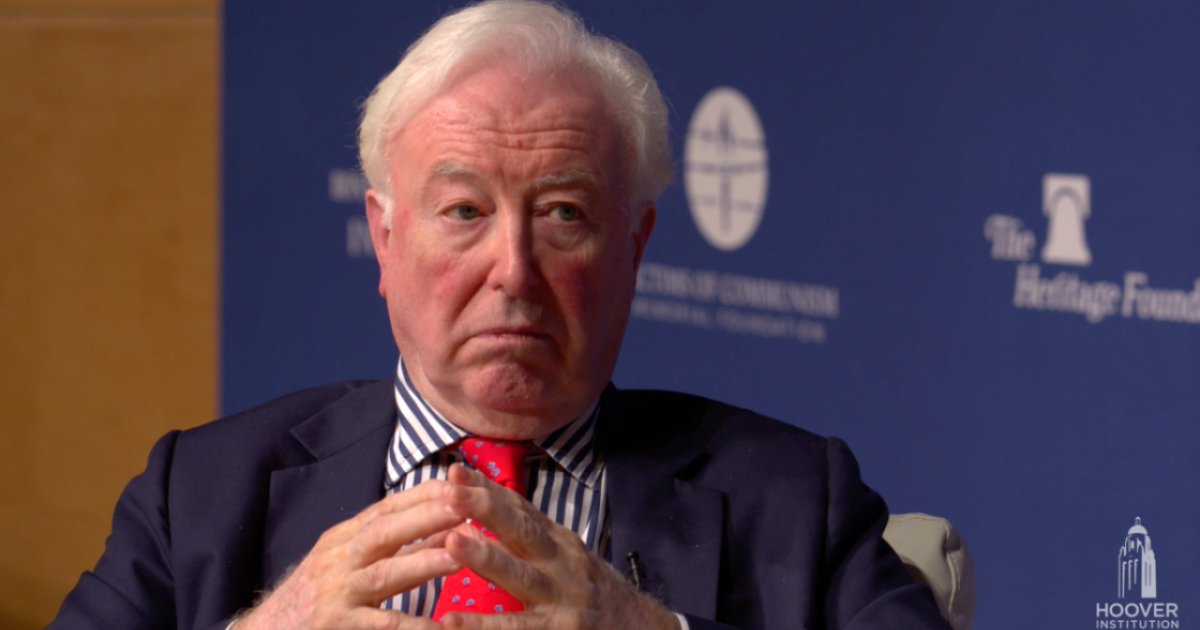- International Affairs
Recorded on September 26, 2018.
As the Brexit deadline of March 2019 draws near, John O’Sullivan discusses the status of Brexit today and the history of Britain’s decision to enter the European Union in 1973. He explains how Britain’s entry into the European Union first came about under Margaret Thatcher. He argues that British citizens had objections to joining the European Union back in 1973 and those objections never went away. Over the past forty-five years, the British have become increasingly more skeptical and frustrated with the European Union and resent the degree of its interference in the government’s decision making.
O’Sullivan and Robinson talk about the upcoming March 2019 deadline set by Theresa May for Brexit to officially occur. They talk about the state of the government as it stands, its preparedness for Brexit, and the opposition to Brexit by some parts of the government and the younger citizens.
Additional Resources:
- How to Get the Best from Brexit with Daniel Hannan
- Niall Ferguson’s Brexit Conversion
- Niall Ferguson on Understanding Brexit and Donald Trump (Pt. 2)
- We Have Six Months to Foil Brexit. And Here’s How We Can Do It
- Hoover Fellows Weigh In on Brexit
Peter Robinson: With us today to explain what is happening in Britain and Europe, a man who wrote speeches for Margaret Thatcher and now lives in Budapest. John O'Sullivan on Uncommon Knowledge in Washington DC, now. The journalist and author, John O'Sullivan, has worked for the Times of London, correct?
John O'Sullivan: Yes.
Peter Robinson: The Times of London. Thank you, John. Wrote speeches for prime minister Margaret Thatcher, edited the American magazine National Review and now is chairman, president, director, of the Danube Institute?
John O'Sullivan: President.
Peter Robinson: President of the Danube Institute in Budapest, Hungary. John, thank you for joining me today.
John O'Sullivan: It's a pleasure to be here.
Peter Robinson: Brexit. First of all, a very basic primmer. What is it?
John O'Sullivan: Brexit is shorthand for Britain exiting the European Union.
Peter Robinson: All right, and this whole Brexit is also shorthand for a political event of two years ago now? A referendum in 2016?
John O'Sullivan: Yes, that's right. Two years ago, a referendum in which the British people voted essentially 52.48% to leave the European Union. Because, of course, the question on the paper didn't lay down explicitly what the European Union was, and therefore there are lots of arguments over which institutions it should leave, but fundamentally it means leaving the European Union legally. It means no longer being subject to its rules, laws and regulations, and no longer being part of a free trade area, customs union with a common tariff barrier, and various other things, and part of a regulatory apparatus as well.
Peter Robinson: Right. Now, I'm going to stick with the basics of the history here. Frankly, to refresh my own memory in this. There are a couple of events in the 60s and 70s. Britain tries to get in and De Gaulle rejects the British application for membership in the European Union. Is that correct?
John O'Sullivan: It is correct, and furthermore, De Gaulle did so with an explanation which many people who would support Brexit now would completely agree with. He said Britain was a different kind of country. It wasn't continental, it was a worldwide country. It had worldwide markets. It had colonies abroad even though they were now independent. Nonetheless, we had special relationships with them and it had supply lines economically that took British goods and British imports and exports from and to places on the other side of the world like Australia and New Zealand, Southern Africa, in a way that wasn't true for continental-limited or based economies like Germany.
Peter Robinson: Nevertheless, De Gaulle leaves the presidency of France in 1968, and in '73 ... Have I got the date right? Prime Minister Heath goes into the European Union. The application is accepted. All the paperwork, the politics and Britain joins the European Union in what year? Remind me, John.
John O'Sullivan: It became a member in '73. I mean, January 1st. The decisions having been actually voted on in parliament in 1972. Then, there was a referendum in '75 when the Labor Party ran the election campaign, promising a referendum, but Harold Wilson, quite a wildly political operator, who didn't want to leave, managed to phrase it, run things in such a way that the government ended up recommending staying within the European Economic Community, as it then was. Because the conservatives obviously an action they'd already taken of being in, that particular referendum went very strongly in favor of remaining within the European community.
Peter Robinson: What that establishes, I want to come back to this, just to state it, by 1975, both the Tory government, the two big parties in Britain, the conservative party known as the Tories and also known as the Tories and the Labor Party. It's a Tory government that takes the country into the European Union and by 1975, the Labor Government has effectively ratified that decision. Then, of course, the people themselves ratified in the large referendum, but it becomes the consensus view right away, at least among the governing classes, that Britain ought to remain in the European Union. Is that fair?
John O'Sullivan: It is fair, and I would say both parties, however, were divided. The divisions on the right were not so evident then, I mean there was a strong anti-marketeers. They were then called anti-marketeers who didn't want to be in the common market, and that they were probably about 40 or 50 members of parliament, but they were representative of deep concerns within the conservative party in the country, which Edward Heath and the cabinet essentially overrode. The opposition in the 1975 referendum looked as though it was the two extremes against the moderate center, and that's always a recipe for political defeat.
Peter Robinson: Right. All right. This brings us then to your old boss and my hero, Margaret Thatcher. And Mrs. Thatcher, there's a complicated history there of her views on the European Union. Can you just sketch it in her view and actually, if I may, ask you to make a distinction between her views as prime minister and her views as she continues to give major speeches in which she mentions the European Union after stepping down as prime minister? In those few years when she still had good health and remained a major public figure, and it's my feeling, but you're going to fill me in that her thinking changed or shifted or deepened, but give us [crosstalk 00:06:01].
John O'Sullivan: I should preface that by saying that there is a dispute about Mrs. Thatcher's final views. There are some people who are close to her, who believe she would have supported Britain's remaining a member of the EU on practical grounds. It's very difficult to get out. We don't want to lose access to the European market and that kind of thing. I would say the majority of people close to her take the view that by the time of her death, she had definitely decided to leave. I would say you can see a clear trajectory in her political career.
John O'Sullivan: She begins as someone who hasn't really thought a great deal about it. She was more concerned with other things. When she becomes party ...
Peter Robinson: She's in parliament in '73 when ... Or just '72 when the decisions are taken?
John O'Sullivan: That's right. But the bigger questions for her then were the questions of economic policy, and anyway, this was not a matter of great concern to her, but she's the party leader at the time of the referendum in '75, and she is what I would describe as an unenthusiastic supporter.
John O'Sullivan: Then, as prime minister, she becomes increasingly skeptical of Britain's detachment to the EU, increasingly angry with the EU leaders and increasingly getting involved in rouse about we want our money back. We're giving too much to Europe and not getting back enough in return. By the time that she has reached ... A few years before she leaves office, or is thrown out of office, Mrs. Thatcher ...
Peter Robinson: She serves from '79 to '91.
John O'Sullivan: Yes, and there's a famous moment in 1990 when she goes to the conference a few summers in Rome. A number of important events happened there, but essentially she's sandbagged or ambushed and the EU leaders begin to push through a much more federalists set of ideas. She returns to the House of Commons. She makes it plain. She's against these political powers being surrendered by parliament to the European Union, as it is now, I think. There's a rebellion against her lead by Geoffrey Howe, of senior conservatives. The party in the country was, I would say at that point on her side, but in parliament, it was still oppose to these moves that people were worried about. Thought them somehow dangerous.
John O'Sullivan: She lost office, and then in opposition ... I'm sorry, not in opposition, but in semi-retirement, she voted against the future measures towards an European unification, the Maastricht Treaty. In her book Statecraft, and in her memoirs, she makes it play. She's increasingly skeptical.
John O'Sullivan: By the end of her life, she has confided in letters and conversations to several people that she would now support leaving. She makes remarks in some of her writings and particularly in Statecraft, which make that plain that's the direction of her thought. By the end of it, she's someone who wants to get out, but she no longer the dominant figure she was, and anyway, she in a sense, has the respect that most former prime ministers have for letting other people get on with it.
Peter Robinson: I want to get to the ... Obviously, I want to come up to today, but of course to the referendum in 2016, but it's a very striking to me as a layman, or is on the other side of the Atlantic, all kinds of developments take place in postwar Britain that relatively, well, not quickly, but with the passage of time become granted.
Peter Robinson: The Attlee government votes in the welfare states. Centerpiece of that is the National Health Service. The most conservative person in parliament never says a word about, "I still object to the National Health Service." This is different. There were objections to going into the European Union and they never went away. Is that right?
John O'Sullivan: That is right. By the way, the national health service is perhaps an exception, too, since as Nigel Lawson said, it's the closest thing the British have to a religion, and everybody goes along with it for that reason. But yes, you're correct. I looked at the opinion polls from 1976 right up to the referendum, and generally speaking, the opposition to Britain's membership never fell below 30. Occasionally, it did. It was very often in the middle and high 40s. Once or twice, it was above 50%, and there was a steady movement in the last four or five years before the referendum to increasing skepticism and opposition.
Peter Robinson: On account of what? What is the public ... I want to get to the arguments in a moment, but what is the public and what are the politics of the matter? Why is the public shifting against the EU?
John O'Sullivan: I think the British are different to the other Europeans in that they resent the degree of interference from European institutions in public life, and they resent what they perceive to be, in my view correctly, a loss of independent democratic decision making in England. I think the basic argument for the leave side is to say, "I was born and lived in self governing independent democracy and I want to live in one again."
Peter Robinson: And is it as simple as that?
John O'Sullivan: It is as simple as that.
Peter Robinson: It's hard to suppose Mrs. Thatcher would have opposed that statement.
John O'Sullivan: Ah, but the point is, not only do some people oppose it in the past, they oppose it now and they say this is just theology and Britain is more prosperous as a member of the European Union, and we think that that's real power. Sovereignty is a trivial or it's a mythical thing. You have more influence in the world as a member of a larger unit than you do as an independent one. My reply to that is, I'd rather have 100%decision making for Britain than 1/27 of the decision making for Europe, particularly when our interests are misaligned with those of our European partners, and we lose most of the serious contested disputes.
Peter Robinson: Why did the government, the Tory government, and we're now back to a Tory government. David Cameron is the prime minister. George Osborne is the Chancellor of the Exchequer. These are highly accomplished, intelligent people, and why did ... Both of whom opposed Brexit, wanted to stay in, they were remainers. Why did the government agree to put a second referendum to the British people?
John O'Sullivan: They didn't really have a great deal of choice. The opposition to Britain's membership, as you and I just discussed, was persistent and enduring and growing. Their own party was hostile, and increasingly so, and then they found themselves in the position that members of parliament said, "We will vote against the government on this issue unless you accommodate us." The obvious form of accommodation was to say, "Look, among ourselves, we think we'd win a referendum hands down. Why don't we give them one and then that'll shut them up at least for 40 years?" That was in a sense what they decided to do.
John O'Sullivan: Now, I don't think they took the decision lightly, by the way, because there was a risk which turned out to be a serious risk, but nonetheless they thought they'd win it and they thought that otherwise the party would be torn in two. That's why, for example, the Liberals and the Labor Party say this is an internal war in the Tory party and they're just dragging Britain into it. But it turned out that 52% of the British people wanted to leave. That undercut that argument.
Peter Robinson: Right, right. A couple of arguments against the referendum, as I understand it. Item one, the margin was too narrow. You can't take a decision that's binding on future generations that's so momentous and that overturns for decades of membership and an international organization on the say so of four percent of people who happened to vote that day.
John O'Sullivan: You might argue that, but you might equally better argue that if you have run an election on the promise, we will not enter the European Union, our commitment is to negotiate no more, no less, and then you negotiate, you enter, and that's exactly what happened in 1970 and '73. In other words, the Tory party did not promise it wouldn't enter it. It promised it would simply negotiate, and then without any referendum of any kind, it entered. That is one of the reasons for the slumbering resentment that has tended this issue, and as it happens, why shouldn't the majority win that particular argument? You're saying that we shouldn't get out because only 52% say so, but on the other hand, why should we stay in? Because 48% say so.
Peter Robinson: All right. John, what about argument according to age? Younger people voted more favorably toward remaining, so the argument goes, if Brexit is put into effect, it's because old people who after all will die off soon enough, are forcing their children and grandchildren to leave the European Union to which they're actually attached.
John O'Sullivan: Well, there is a majority among young people for the remaining in, but on the other hand in all other groups, I think certainly people over 35 until you die, there's a majority for leave. By the way, the young people just didn't turn out in the referendum in the manner that they did. But even so, let's not exaggerate this. It's essentially, whether you look at social class or age or anything else, the division is generally about two thirds versus one third. If you say, "Look, highly educated people voted to remain," one third of them voted to leave. We shouldn't over exaggerate this particular argument. But having said that, the democratic principle is one man, one woman, one vote. You can't simply say, some votes are worth more ... All votes are equal, but some votes are more equal than others.
Peter Robinson: I have to say, there've been moments watching the Brexit debate when I can't quite sort out what the remain argument might be. Because this notion, lots of ... Michael Caine, the actor was being interviewed about this and he was asked about Brexit and he replied, "I would rather be ..." And the argument was, if we leave Brexit, we've lose trading arrangements, it may hurt the economy, and Michael Caine replied, "I'd rather be a poor free man than a rich slave." Of course, to every American, of course. Sovereignty, national pride, patriotism. What is the argument against?
John O'Sullivan: It's very interesting you say that because the argument of the remainers was these people would never vote to leave if they knew it would cost them money. The opinion polls then ask the question, supposing you are to be worse off as a result of leaving, would you still vote to leave? And the majority of people said yes. At which point they were marked by the remainers as fools who, in a sense, getting nothing serious in return for losing some income.
John O'Sullivan: By the way, the loss in income, even if you take the treasury arguments and others, is not that terribly great, is rather like saying, "You know, if you vote to leave, you'll be as poorly off as you were in 2015." I mean, that's not all that serious. I think that once you examine the remain arguments, they tend to fritter away, and the reason why, for example, some intellectuals, particularly economists, have been on the remain camp, is because they attach overriding importance to such questions as the marginal improvement in wages or whatever.
John O'Sullivan: Whereas other people look at what's happening to the country and say, "This country is not the way I remember it. The police aren't as polite. There's far more disorder and riot. We're not so happy, our street is different. We would like to be the way we were. Now, you could never return to what you were, but you can return to some aspects of it. Namely, we want to govern ourselves.
Peter Robinson: Right. John, that brings us to the present day, which I have to say the British politics at this point absolutely baffle me. This may involve departing from Brexit for just a moment, but Jeremy Corbyn ... Well, let's put it this way. Back when I was studying in England, Margaret Thatcher was prime minister and the leader of the opposition was, for all intents and purposes, a fellow traveler. He was Michael Foot, and the idea that the current leader of the Labor party, Jeremy Corbyn, is by all accounts further to the left than the man who was leading the Labor party in the late 70s and early 80s is just incredible. How could this ... First of all, is that so? And how could it have happened?
John O'Sullivan: I think we should correct something on Michael Foot.
Peter Robinson: Have I been too hard on Michael Foot?
John O'Sullivan: Michael Foot was on the left and the Sunday Times keeps trying to prove he was a Soviet agent, but he was an old-fashioned, radical leftist, and at the era of the left ... By the way, he and Enoch Powell formed an alliance against going in the first time, and they both agreed, but if we have an election in this country and it selects a Labor government, then that's for the British people to decide, or a conservative government. It's not for someone else to say, "Oh, look, you don't want that government in this country. We'll make sure that can't happen." That's the actual argument, which is sometimes used by remainers. I think it's a sinister argument, even if it's sort of dressed up in concern.
Peter Robinson: I wronged Michael Foot. He wasn't involved in international conspiracies. He was a British man of the left, but still ...
John O'Sullivan: Jeremy Corbyn, in my view, is a sinister clown. There are other people who are sinister around him. I, myself, don't think he will ever be elected. I don't believe that the Labor Party under his leadership will win an election because, for example, he hosted Sinn Féin at a time when Sinn Féin's ally, the IRA, in fact, they were the same people, with their guns and the cloakroom, and they were blowing up cities and killing people and shooting soldiers. I mean, that record is there. I don't think he'll ever win, but suppose he wins for the sake of the argument. In my view, what would then happen is that he would lose the next election.
John O'Sullivan: Would they install a Stalinist dictatorship? If he tries, I don't think he'll succeed. I think as in America, I think there are enough safeguards against that kind of governmental excess, to prevent that happening. I don't believe he will be elected, and if he is, I don't believe he'll be reelected. I'm relatively optimistic on that score, and I wouldn't be persuaded by Mrs. May or anyone else that if we didn't adopt her particular idea of how to leave Brexit, that we will get at Corbyn. I don't think we will.
Peter Robinson: Now, correct me on this, but if I understand it correctly, prime minister May, 18 months ago, invoked a certain legal clause in the European Union documents which is recognized by all 27 members as valid, and from the moment she invoked that two years remained until Britain left the European Union one way or the other, and that date of leaving is in March of 2019.
Peter Robinson: We are now a single digit number of months away from leaving. The British government can't agree among its own members the terms on which it wishes to leave renegotiating this, that, and the other aspects of trade, still less as Britain been able to agree with European negotiators. How bad would it be if March 2019 arrived and there's simply no agreement and Britain simply, from one day to the next, "We're no longer a member of the European Union," lost all the favorite trade agreements and so forth. Crashed out, I think is the term.
John O'Sullivan: The other term is to leave under the rules of the World Trade Organization, and this is the one occasion in which all of the globalists are suddenly unenthusiastic about international organizations and international rules. Now, of course, everybody accepts that there would be real difficulties as a result of leaving overnight, so to speak. But the people have spoken, too. All say that this is a transitional problem. It will last nine months, maybe a year.
John O'Sullivan: With goodwill, which by the way is mandated internationally under international law, all these problems can be overcome. But let's suppose they're not overcome because of ill will on the part of the European Union. Isn't that an argument for not wanting to be a member of a club whose members dislike you so much that they want to punish you for following the rules under which you leave? Which is the rule you described.
John O'Sullivan: I think the argument is that we want to govern ourselves, and the problem with Mrs. May's answer is, she is conceding so many practical matters which will continue to be ... We would continue to obey the rules and regulations of the European Union, that had a certain point, you are not leaving at all. You're remaining in. The one difference being that you remain under the rules and regulations, but not being a member ...
Peter Robinson: You've lost the vote.
John O'Sullivan: You've lost the vote.
Peter Robinson: All right. Last question, John. March 2019, roughly speaking, what will be the terms under which Britain leaves and on that day who will be prime minister?
John O'Sullivan: I don't know the answer to those questions because I can't foresee the future, and the next few weeks may in fact determined the last question, but I would say that by the time ... If Britain doesn't leave on the date agreed, there will be enormous social ferment and not only so to speak in the streets, but there'll be a ferment in the conservative party.
Peter Robinson: When you say Britain doesn't leave, you mean if somehow rather the governing classes overrule the referendum ...
John O'Sullivan: If Britain applies for and extension is granted, that kind of thing, yes. But that will be regarded as you just described, as the establishment overruling what the people have decided.
John O'Sullivan: As in the United States, the conflict over populism and democracy, and elitism, are so strong at the moment that it would be a very reckless act on the part of supposedly cautious politicians if they decided to put Brexit into cold storage and deal with it down the road. I find that hard to imagine that happening. If it does happen, I think there's going to be a massive change in both political parties. I would think a general election, and in those circumstances, you cannot rule anything out except, and even perhaps, a Corbyn government.
Peter Robinson: John O'Sullivan. Thank you. I'm Peter Robinson for Uncommon Knowledge in the Hoover Institution. Thanks for joining us.







